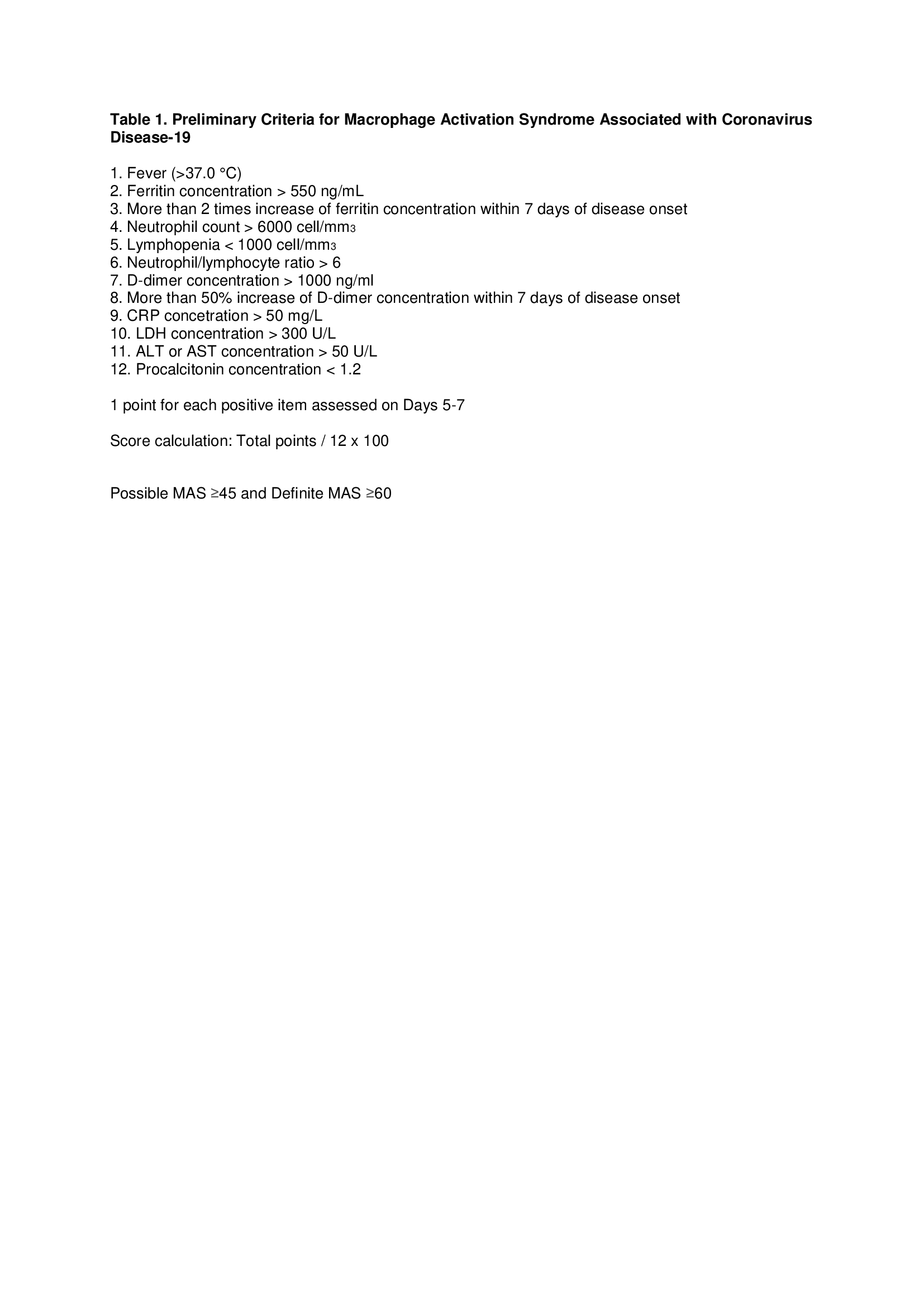Session Information
Session Type: Poster Session D
Session Time: 8:30AM-10:30AM
Background/Purpose: COVID-19 runs a severe disease associated with acute respiratory distress syndrome in a subset of patients, and a hyperinflammatory response developing in the second week contributes to the worse outcome. Inflammatory features are mostly compatible with macrophage activation syndrome (MAS) observed in other viral infections despite resulting in milder changes. Early detection and treatment of MAS may be associated with a better outcome. However, available criteria for MAS associated with other causes have not been helpful. To identify distinct features of MAS associated with COVID-19 using a large database enabling to assess of dynamic changes.
Methods: PCR-confirmed hospitalized COVID-19 patients followed between March and September 2020 constituted the discovery set. Patients considered to have findings of MAS by experienced physicians and given anakinra or tocilizumab were classified as the MAS group and the remaining patients as the non-MAS group. The MAS group was then re-grouped as the cases with exact-MAS and borderline-MAS cases by the study group. Clinical and laboratory data including the Ct values of the PCR test were obtained from the database, and dynamic changes were evaluated especially for the first 14 days of the hospitalization. The second set
of 162 patients followed between September-December 2020 were used as the replication group to test the preliminary criteria. In the second set, hospitalization rules were changed, and all patients required oxygen support and received dexamethasone 6mg/day or equivalent glucocorticoids. Daily changes were calculated for the laboratory items in MAS, borderline, and non-MAS groups to see the days differentiating the groups, and ROC curves and lower and upper limits (10-90%) of the selected parameters were calculated to determine the cutoff values.
Results: A total of 769 PCR-confirmed hospitalized patients were analysed, and 77 of them were classified as MAS and 83 as borderline MAS patients. There was no statistically significant difference in the baseline viral loads of MAS patients compared to the non-MAS group according to the Ct values. Daily dynamic changes in the MAS group differed from the non- MAS group especially around the 6th day of hospitalization, and more than a twofold increase in ferritin and a 1.5-fold increase in D-dimer levels compared to the baseline values help to define the MAS group. Twelve items selected for the criteria are given in Table 1 below. The total score of 45 provided 79.6% sensitivity for the MAS (including borderline cases) and 81.3% specificity around days 5 and 6 in the discovery set, and a score of 60 increased the specificity to 94.9% despite a decrease in sensitivity to 40.8%. The same set provided a similar sensitivity (80.3%) in the replication, but a lower specificity (47.4-66% on days 6 to 9) due to a group of control patients with findings of MAS possibly masked by glucocorticoids.
Conclusion: This study defined a set of preliminary criteria using the most relevant items of MAS according to the dynamic changes in the parameters in a group of COVID-19 patients. A score of 45 would be helpful to define a possible MAS group with reasonable sensitivity and specificity to start necessary treatments as early as possible.
To cite this abstract in AMA style:
Amikishiyev S, Gunver M, Bektas M, Aghamuradov S, Ince B, Koca N, Torun E, Aliyeva N, Sari S, Cetin C, Dulundu B, Deniz R, Kemik F, Agargun B, Gulseren U, Besisik B, Alkan O, Bağrıaçık C, Tor Y, Senkal N, Catma Y, Durak G, Mese S, Agacfidan A, Kose M, Erelel M, Çağatay A, Besısık S, Esen F, Gül A. Preliminary Criteria for Macrophage Activation Syndrome Associated with Coronavirus Disease-19 [abstract]. Arthritis Rheumatol. 2021; 73 (suppl 9). https://acrabstracts.org/abstract/preliminary-criteria-for-macrophage-activation-syndrome-associated-with-coronavirus-disease-19/. Accessed .« Back to ACR Convergence 2021
ACR Meeting Abstracts - https://acrabstracts.org/abstract/preliminary-criteria-for-macrophage-activation-syndrome-associated-with-coronavirus-disease-19/

